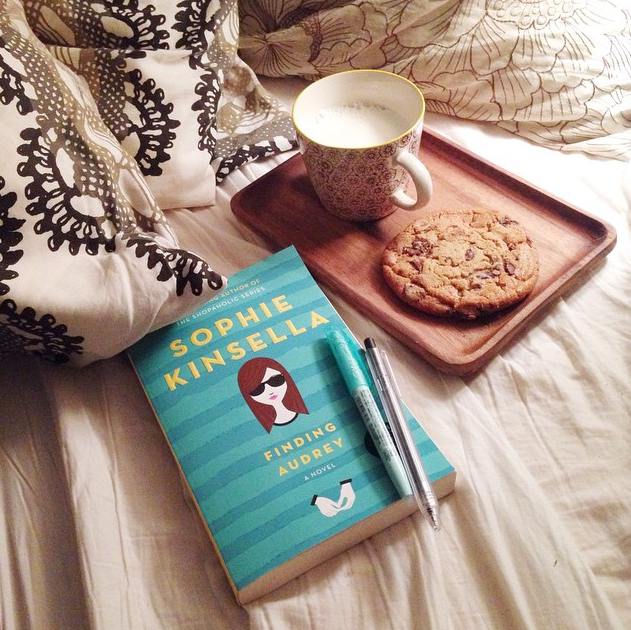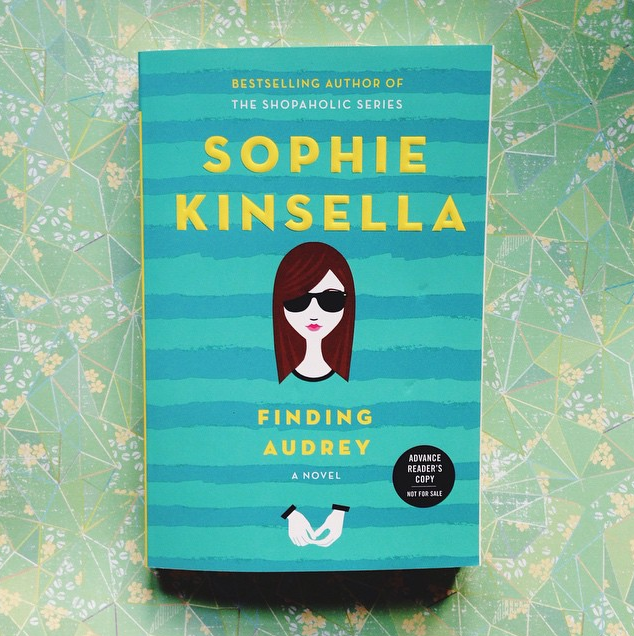Finding Audrey by Sophie Kinsella. Delacorte Press, out now.
[I received this book from Random House Canada in exchange for an honest review; this did not affect my opinion of the book whatsoever.]
Breathe in for four counts, out for seven.
Your body believes the threat is real, Audrey. But the threat isn’t real.
Sophie Kinsella has taken a big move from her Shopaholic series into the realm of YA to tell the story of Audrey, a high school girl who’s dealing with a lot of stuff after a traumatizing incident at school. Audrey hides from the world behind her big, dark sunglasses and only communicates with her wacky family, finding it hard to even leave her home. That is, until her brother’s friend Linus takes initiative in trying to break Audrey out of her bubble. Audrey was a victim of some sort of bullying from a group of girls at school – it was so bad that she’s been living at home for a year before transferring to another school, and she hears talk of how the other girls were suspended. Since then, it’s hard for her to even make eye contact with her family, let alone get out of bed in the morning. Finding Audrey is the story of just that – a girl making her way towards feeling better.
So now you know.
Well, I suppose you don’t know – you’re guessing. To put you out of your misery, here’s the full diagnosis: Social Anxiety Disorder, General Anxiety Distorder, and Depressive Episodes.
Episodes. Like depression is a sitcom with a fun punch line each time. Or a TV box set loaded with cliffhangers. The only cliffhanger in my life is “Will I ever get rid of the shit?” and believe me, it gets pretty monotonous.
I was drawn to the book for its obvious YA + mental health hook. I only really read the first Shopaholic a long time ago in high school, so I wasn’t coming to Finding Audrey as a Kinsella super-fan, though I am interested in seeing how authors transition audiences. Kinsella’s going to bring a lot of her readers over to Audrey – and I’m willing to bet they’re going to love this book just as much.
Anyways – the strongest point of this book is its look at mental health – candidly discussing diagnoses, ticks, feelings, consequences, feeling sick, and anxiety. I really liked the way Audrey spoke to her ‘audience’ of what she was feeling and thinking and how frustrated she would get with herself through learning her physical and mental reactions – and as clear as she was this way, she wasn’t as clear outside of those sunglasses. I found it compelling to read about each step she took in order to go back to her old self again. Her therapist gives her assignments like document her family at home and try to make it to a Starbucks.
It’s everyone else who is the problem. People on the street, people at the front door, people on the phone. You have no idea how many people there are in the world until you start getting freaked out by them.
I wasn’t a big fan of Audrey’s family storylines – there’s a long-winded back-and-forth between her high-strung mom and her misunderstood brother Frank who scream at each other about playing video games. It became really annoying very quickly. Way too many “FRAAAAANK!”s. I can see how Kinsella was using it as comedic relief, but it would have been funnier if it was more subtle, I think. It also didn’t have much to do with the story. Really, it mainly just shows that even though her family members are soaked up in their own problems, they’re still there to protect Audrey, which gives you a different angle to a lot of books that may portray a teen as feeling neglected by their family.
Then there’s the romantic hook – Linus. For the most part I found the relationship between Audrey and Linus pretty cute. Linus initiated talking to Audrey by passing notes between her younger brother Felix.
Is this easier than talking?
A bit.
Sorry I mentioned your dark glasses. Sore point.
That’s OK.
I remember your eyes from before.
Before?
I came round once to see Frank. I noticed your eyes then. They’re blue, right?
Linus and Audrey quickly become much more comfortable with each other, which wasn’t totally backed up in description – I want to know more about how someone who has such a hard time being around people suddenly has a much easier time being around this one person. There’s a point when Audrey meets up with a friend later in the book and I thought how I’d be a lot more interested in reading about the close friend dynamic after a traumatic situation than a typical crush.

That said, I really did enjoy reading Finding Audrey. Audrey has a sweet and smart voice – you’ll wish you could get to know her in real life. Readers will take away a solid understanding of how teens deal with severe mental health, a cute love story and will be rooting for Audrey to find her way back into the world. I have no idea if it’s planned, but if there was a sequel coming, I think I’d be interested in reading in Audrey’s next chapter back at school, making new friends and still dealing, because anxiety and depression does not just suddenly go away, especially after a traumatic event. I like that Audrey admits to her limits and where she’s at, acknowledging that she still has a lot left to go through.

